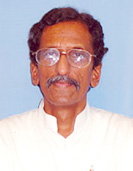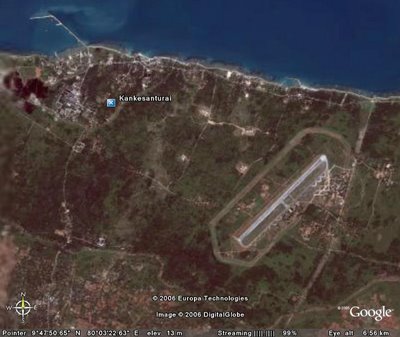nobody wants war. only self styled 'saints' with limited experience about other people will even think that anybody except real nut cases will prefer war.
however that does not mean we should prefer peace at any cost, especially at the cost of human rights, freedom, justice, and democracy. we have no right to hand over fellow sri lankans to a megalomaniac bent of creating a personal dictatorship ( ltte is certainly not fighting on behalf of tamils, insistence on sole representative status is a good indication of that) on the blood of others, including children, in order that 'we' in colombo can have 'peace'.
imo such a peace is as morally repugnant as war.
so what is the alternative?
i have expressed my personal opinion on this in various comments in this blog and others as well as in some blog posts.
this one for instance. but i thought i will devote a post exclusively for it.
for me due to reasons i set out above, appeasement of ltte in order to obtain peace is morally unacceptable.
in addition given ltte instinctively prefer violence and threats when they want something, regardless of any agreements they have signed or whatever obligations they were under (as demonstrated by the recent
water blockade and the fate of ceasefire agreement from the first) i doubt whether even a nominal 'peace' may result from such appeasement. appeasement of
other terrorist groups and
violent fascists is one of unending failure down the ages.
i also believe that given the limited resources of the country and our unwillingness to concentrate all our resources on behalf of the war effort, we probably (we can never be certain) cannot win a full scale war. we can and have contained the terrorists (a highly creditable achievement for
our military given the difficulties some very resource rich countries are experiencing against much weaker opponents) but i doubt whether we can exterminate the ltte by military force alone.
nor do i support putting the country on a war footing with full concentration of resources for war (with conscription, curtailment of political rights, etc. that such a situation would involve) unless as a last resort.
what to do then? unfortunately there is no easy answer to that.
in my opinion the ultimate result should be an effectively defeated and/or contained ltte, without initiating and avoiding as far as possible, a full scale war. to obtain that result sri lankan government should aim at,
- preventing ltte gaining any more power, militarily, politically, diplomatically, or financially.
- avoidance of military action involving the regular military as long as above objective is achieved.
- doing everything possible to proactively reduce ltte's power without jeopardizing the above two objectives
that means holding the ceasefire as long as ltte hold it. if it tries to increase its power by some violent action( such as blocking water, killing military personnel etc) government should respond robustly, in proportionate and limited manner, to ensure that the terrorists end up in a similar or worse off position to the one they started off prior to the violence.
government must also do everything in its power to diplomatically isolate ltte, discredit ltte's claims to legitimacy, break up its support networks, counter its propaganda, etc.
on no account should government enter into any substantive agreement in relation to devolution of power with the ltte. that would only increase ltte's power. government must make it clear to both ltte and international community that as long as ltte remains what it is, it will not enter into any such agreement. the government should never legitimize ltte's claim to represent north east tamil community.
instead it must make it clear that very real tamil grievances can only be addressed through democratically elected tamil representatives not through ltte. it must request international community to put pressure( not that it will work at present) on ltte to change itself and disarm in order to claim any legitimate political power. government may propose and/or implement measures to address those tamil grievances unilaterally (since democratic tamil representatives from ne are non existent at present) as a temporary measures as long as ltte is unable to profit from them. government must do its best to help and protect alternative tamil political leadership.
how would ltte respond to such a policy?
options available to them are limited in such a situation.
one option is to hold the ceasefire and talk to government knowing well no substantive agreement will be on offer. this has the added risk (from ltte point of view) of progressive weakening of their organization, due to the stalemate and stagnation during ceasefire. there is reason to believe this was already underway during the last few years and that their deliberate drive for war this year,
apparent from last presidential election, was partly motivated by an attempt to counteract this. so given the dead end why would tigers even consider this option? mainly because of their desire to hold on to what they have already acquired ( illegitimately ) since they can be sure government won't try to take those away by force as long as the ceasefire holds.
but ltte won’t take the above option as long as they have a military option. that is why government must respond robustly and make sure ltte does not gain anything by military actions. government must respond in proportion to the ltte's violence and must be prepared handle the full range from small scale breaches of ceasefire to full scale war, if ltte so prefers. while military may be unable to win the war outright, it can certainly force ltte to a stalemate. the end lesson must be clear: ltte won't get anywhere by military actions.
the third option for ltte is to disarm and transform itself into a democratic political party. this is highly unlikely at present and as long as present leadership is in place.
given options available to ltte, we can expect it to alternate between the first option (talks that go nowhere) and second option (military actions that go nowhere) until ltte progressively become weak and flexible enough to choose the third option.
imo what i described above is the only viable alternative to war (that won't get us anywhere) and 'peace' (that won't get us anywhere either) and it is certainly less morally repugnant than either the war or the peacenik peace.
government policy the present buffalo administration as a result of a combination of several factors ( influence of jhu/jvp warmongers , pressure from international community, economic situation of the country, actual military reality etc. ) has somehow stumbled on to a policy similar to above described alternative. i don't think they deliberately planned for it. as i said it may be the only viable policy and as result all governments that come to power will be forced on to it eventually. let’s hope they recognize that policy's essential features and aims and understand the available options when implementing it.
under such a policy sri lanka will go through alternating periods of high and low intensity conflict for several more years, we will have to get used to that reality, because everything else is worse.





